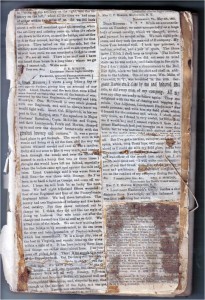Letter to Lt. Morton's Father about Falmouth Skirmish
Lt. Charles E. Morton, 2nd New York (“Harris Light”) Cavalry, described his regiment’s arrival in Falmouth in a letter to his father. His letter (full text below) was published in the Newburgh Journal and pasted in a scrapbook by his brother, an officer in the 5th New York (“Ira Harris Guard”) Cavalry. Edward W. Whitaker, 2nd New York (“Harris Light”) Cavalry, related, “The F.F.V.s [First Families of Virginia] have absconded and left the Overseers – poor whites and slaves. Whole histories can be learned from the papers left in the houses.”
FALMOUTH, (opposite Fredericksburgh) Sunday, April 20th, 1862.
Dear Father: We left Weaverville early Thursday morning, as I wrote to you. We came down this way about 15 miles, when we came on the enemy’s pickets, who fired and run. We had quite an exciting chase of 8 or 10 miles after them. The Lieutenant Colonel [H. Judson Kilpatrick] had his horse shot in the leg by a rebel officer; about 4 o’clock p.m., Col. [W.H.F. “Rooney”] Lee came out with a squadron of cavalry and fired on us which we returned and followed them up so close that we took three prisoners. Lieut. Decker from Orange Co., was gallantly leading his men, and coming up alongside of a rebel officer, made a cut at him, when he turned and shot him with his revolver through the heart. He fell and his horse followed [damaged and illegible] the rebels. Decker was too impetuous and venturesome, but we will yet revenge his death. He was the only one we lost that day. We followed up the enemy to within 5 miles of this place, where we found their deserted campfires burning. As it was 8 o’clock, and we had ridden 25 miles, we halted to rest our men and horses, and wait for the infantry and artillery to come up, as our Regiment had the advance. Our boys assisted the 14th Brooklyn along the road by getting off and letting them ride, and by carrying their guns. About two o’clock a.m., we started on again with Colonel Bayard’s [1st] Pennsylvania Cavalry for this place, to surprise the enemy and prevent their burning the bridges that cross the river to Fredericksburgh. We went along very quiet for two or 3 miles, Colonel B[a]yard’s regiment, one squadron, had the advance; Lieutenant Colonel Kilpatrick wanted General Auger [sic- Augur] to take along some infantry and artillery with us, but he would not. The road was hard and narrow with woods on each side; we got to a large ditch at the foot of a hill when we heard a volley fired on our advance guard, and back they came, full tilt, and would not stop to fight — they were the Pennsylvania Cavalry. We formed in line, dashed on, jumped the ditch and charged up the hill with a yell that must have been heard at least a mile off. The Secessionists ran for the woods and fired on us, but on we went till we got a second volley, when we halted a moment and Colonel Bayard said to us: “Come on men, mine have all left me; I thought I had soldiers but I find I have none.” Major Harhause was at the head; only our squadron got up on the hill, company H and G, Captain McIrvine, Captain Mulligan, Lieutenants Ferris, Smith and myself. We gave a Hoosier and New York yell combined and charged them through the woods, when we came to a big pile of logs across the road. Our men fought well, but could not do much, as the enemy lay behind the logs and fences. Finding that we were fighting at a disadvantage, I reported the fact to Lieutenant Colonel Kilpatrick, and telling him how we were situated, he concluded we had better retire… So they sounded the retreat, and the men came in, formed in line in good order in a large field in front of the woods, where we remained in line, and the Rebels did not offer to come out of the woods to attack us. The Orderly Sergeant of my company (Porter) led the men of his platoon ahead and behaved in a very gallant manner. We lost only one man killed, Murphy, from New York, and one wounded Micky Dwyer, from the same place, and five horses shot. Company H, the Indiana company, lost three men killed and five wounded. The Pennsylvania regiment lost one man in the first fire. Col. Bayard, of the Pennsylvania Cavalry had his horse killed. It was a regular ambuscade and trap, but it saved us a big fight the next morning. The bullets flew around us pretty thick, I can tell you. The Colonel of the Pennsylvania Regiment in his report to General Augur said: “On the first fire my men run, and had it not been for the coolness of the officers and bravery of the men of the Harris Light Cavalry [2nd New York Cavalry], it would have been a complete route.” The rest of our battalion was in reserve and did not get in the fight; the enemy were all around us, but we astonished them so by our charge and yell that they thought something was let loose on them, and in the dark, they could not see or tell what was going on, and Lieutenant Colonel Kilpatrick called out in a loud voice to “bring up the artillery on the right, and the infantry on the left,” when all this time we had none of either within two miles of us. So we fell back about a mile and remained quiet until morning, when the artillery and infantry came up, when the rebels run down the river, crossed the bridge, and set fire to it as they crossed, having it all prepared for that purpose. They halted on the other side, but the artillery soon shelled them out, and we were compelled to wait here until we can construct a bridge to cross on. We are all well. There is no mail and I have not heard from home in a long time; where we go next I cannot tell. Write soon.
Your son, &c, C.E. MORTON Lieutenant Harris Light Cavalry.
Conner Collection – SCHS

